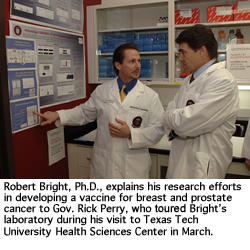Texas Tech University Health Sciences Center
Health Sciences Center Researcher Leads Efforts
To Develop Vaccine for Prostate Cancer
 If a vaccination can eradicate a fatal disease such as smallpox, can the same concept apply to cancer? Much research supports the idea, including the studies conducted in the laboratory of Robert Bright, Ph.D., associate professor in the Department of Microbiology and Immunology at Texas Tech University Health Sciences Center.
If a vaccination can eradicate a fatal disease such as smallpox, can the same concept apply to cancer? Much research supports the idea, including the studies conducted in the laboratory of Robert Bright, Ph.D., associate professor in the Department of Microbiology and Immunology at Texas Tech University Health Sciences Center.
Bright�s group has conducted successful laboratory studies preventing and suppressing prostate cancer using TPD52, a tumor associated antigen identified by his lab. This antigen, believed to be involved in tumor cell growth of prostate cancer, could prove to be the active component for eradicating prostate cancer, as well as several other types of cancer, such as breast, colon and lung.
�Vaccination with intent to eradicate disease is one of the greatest advancements in Western medicine,� says Bright, who also is director of basic research at the Southwest Cancer Treatment and Research Center. �This is an incredible breakthrough because there are very few antigens for human prostate cancer that can be targeted as vaccines, and relatively little is known about the human immune response to this cancer.�
Unlike smallpox, which is caused by a virus, most cancer is a mutation of one�s own cells, Bright says.
�The body�s immune system is designed to recognize foreign matter and go after it, but there was some question as to whether it could recognize and distinguish its own �good� cells and those that have become corrupt, such as in cancer. We�ve found out that it can.�
Bright has worked on this research for more than a decade. He came to Texas Tech University Health Sciences Center in 2002 from Portland, Ore., bringing with him research funded by the National Institutes of Health�s National Cancer Institute and the American Cancer Society.
The idea of fighting cancer with a vaccine is not new, Bright says. �The challenge now is getting the vaccine to the patient in a safe and expedient manner.�
Following publication in April of an article in Cancer Research, Bright says he received communication from researchers worldwide regarding vaccination as a viable option for combating cancer. �Evidence suggests that cancer is 100 percent preventable by vaccine, but there is still a lot of work to do to perfect vaccine before that happens.
�Fighting cancer with a vaccination presents a challenge because each person is unique and their cells are unique. Finding this common target is the first step in developing a vaccine,� he says.
